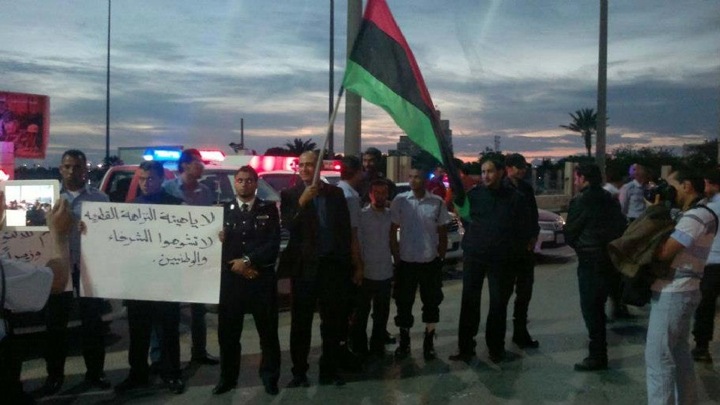By Maha Ellawati.

Benghazi, 19 November:
Members of the police forces and locals gathered in front of Tibesti Hotel in Benghazi last night, . . .[restrict]Sunday, to protest against the barring of ministerial candidate Ashour Sulaiman Shuwail by the Integrity Commission.
Shuwail had been appointed by Prime Minister Ali Zeidan to be Libya’s next Minister of the Interior but then found himself rejected, together with three other nominees, for not conforming to standards of patriotism and integrity. The new government was nevertheless sworn in on 14 November 2012, and nine ministerial positions, including that of the Minister of the Interior, are thus still vacant.
Targeting in particular the Integrity Commission, the protesters brandished slogans such as “No to the Qatari Integrity Commission”; Do not discredit the honorable and patriotic Libyans” and “The Integrity Commission itself does not conform to the standards of integrity and patriotism”.
“Stop jeopardising state security and stability! Let us join hands to build a state of law. We have confidence in Dr Ashour Sulaiman Shuwail and in his ability to set up a strong security apparatus capable of enforcing law and order”, said one police officer. The protestors stressed that Shuwail – who is professor of law and former head of traffic police in Benghazi – was the right man for the position and that he enjoyed the trust of “all people of the Eastern Province”.
Yesterday’s protest is the second in a row after residents of Al-Baida went out on the streets last Thursday 15 November to show their disapproval of the Integrity Commission’s decision. Shuwail is from Benghazi, which partly explains why solidarity demonstrations have so far only taken place in Eastern Libya.
References to the Emirate of Qatar and its supposed interventionist policies seem to have increased lately. From the beginning of the Revolution, Libyans were suspicious of foreign agendas, in particular those of the Gulf countries.
Many believe that concealed forces are – sometimes with foreign support – seeking to influence Libya’s ongoing political process and that the resulting tensions manifest themselves through the barring of candidates who do not fit into the greater scheme. Islamist groups and decision-makers, for instance, are thought to oppose the candidacy of Shuwail who they consider too liberal. The overall impression, however, is that he does have a great deal of popular support. [/restrict]








